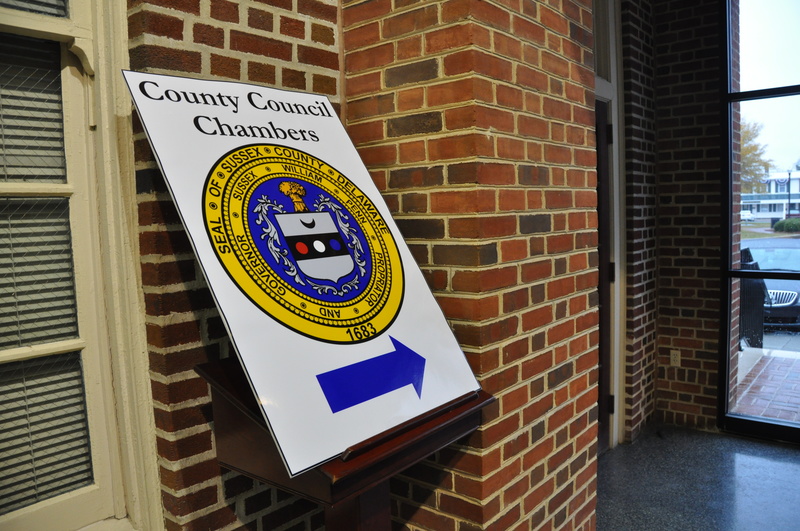When it come to Delaware's Freedom of Information Act, Deputy Attorney General Jason Staib is the first to say the law is not perfect.
Staib spent nearly two hours March 25 explaining the nuances of the law to Sussex County Council. It was the first session of a road show planned throughout the state to educate elected officials and the public about the act.
FOIA is a state law that dictates how public business is conducted so that the public has access to how decisions are made.
One of the major issues with the act is the elected body that formulated the law is exempt from it: the Delaware General Assembly is excluded from the provisions.
In addition, Staib said, the state is allowed to negotiate contracts in confidence until a bid is awarded. School boards, counties and municipalities do not operate under the same process; for these entities, information pertaining to negotiations is open to the public.
|
|
||||
“There are issues with this,” he said.
Councilman Sam Wilson, R-Georgetown, questioned why General Assembly caucus meetings were not open to the public. “There are issues,” Staib said.
Budget discussions, emails subject to law
Staib talked about problem areas with the law, often called the Sunshine Law.
Budget negotiations: Staib said if council members are involved in budget negotiations outside of the public arena, those negotiations could violate the law. He said it's not a problem when the budget is drafted by staff. “A problem occurs when the budget is run by council,” he said.
Sometimes the process to reach a consensus with a group of elected officials does not occur during a public meeting but in an executive session or other meeting, he said.
“When you vote on the budget and the whole process lasts one minute, that's a problem,” he said. “You may have to do budget negotiations in public.”
Emails: Staib said public officials' emails dealing with public business are considered part of the public record – even emails on personal computers. “You have a duty to preserve them,” Staib said. In addition, it's possible that personal notes taken by council members could be deemed part of the public record.
He said it's important to have an ongoing archive policy in place to save records with paper copies of electronic records. “You need to make sure what you need to save and not save; it should be a policy,” he said.
Quorum: When, where and who can meet is always a sticking point, Staib said. For county council, three members of the five-member council represents a quorum. He said council members can gather as a group at functions but they cannot discuss public business. However, two council members can discuss public business outside of a public meeting as long as no other member is brought into the discussion, he said.
Councilman George Cole, R-Ocean View, asked Staib if anyone in the General Assembly was taking the lead to reform the law. Staib said there was no discussion at the state level.
Cole then asked why the Delaware Attorney General's Office was not lobbying for reforms. He suggested that council members write letters to state officials voicing their concerns.
Nuances of the law
All committees and subcommittees supported with public funds of two or more people appointed by the council must follow open government regulations. Work groups of staff members that do not involve council members or members of the public are not subject to the law, Staib said.
“If there is a question, it's important to err on the side of transparency,” he said.
He said there is no limit to how many public records can be requested as long as someone is willing to pay for the records. “And we don't ask why they are asking for documents unless it involves pending litigation,” he said. “We don't answer questions in FOYI; we get documents.”
There is no charge to file a FOIA complaint with the Attorney General's Office, but there is a fee for a request for records.
The county has a detailed policy and set of procedures pertaining to the law. County Communications Director Chip Guy, FOIA coordinator, said while the county receives numerous requests, most requests are completed without charge because state law dictates the first hour of administrative fees and the cost of the first 20 pages of documents are waived. He said most requests are answered within three days.
In addition, he said, many records are already available on the county's website.
“We maintain a detailed logging and tracking of all FOIA requests for accountability purposes, per state law and policy requirements,” Guy said.
County Administrator Todd Lawson said the presentation helped to validate the county's policy. “We have emphasized placing as much online as we can to make it easy for the public to review what we are doing including agendas, minutes, packets, audio, budgets and vendor payments,” Lawson said. “We will continue to strive to add more documents to the county's website to reduce the burden on staff and to add to public convenience.”
Lawson said record collection and retention of records is one area the county needs to improve. “To me, the county has done a lot to remain compliant with FOIA and we continue to improve,” he said.






















































